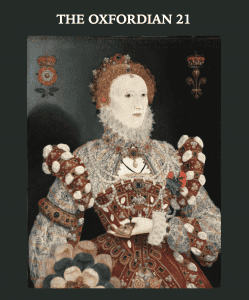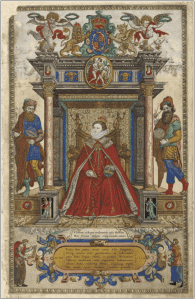The Oxfordian 2019 Now Available
 The 21st volume of The Oxfordian, the Shakespeare Oxford Fellowship’s peer-reviewed journal, has just been published and is available for sale on Amazon.com for $9.99, and on other Amazon outlets at comparable prices. At 286 pages, it is the largest issue of the journal to be published since its inception in 1998. The journal, edited by Gary Goldstein, is also accessible to SOF members for free on its website under Publications/The Oxfordian. Non-members can access three papers for free in this issue: Luke Prodromou’s “The Shakespeare Authorship Debate Continued”; Gary Goldstein’s “Transforming Productions of Shakespeare’s Plays”; and Catherine Hatinguais’ monograph—“Catching the Flood: River Navigation from the Adige to the Po in Shakespeare’s Italy.”
The 21st volume of The Oxfordian, the Shakespeare Oxford Fellowship’s peer-reviewed journal, has just been published and is available for sale on Amazon.com for $9.99, and on other Amazon outlets at comparable prices. At 286 pages, it is the largest issue of the journal to be published since its inception in 1998. The journal, edited by Gary Goldstein, is also accessible to SOF members for free on its website under Publications/The Oxfordian. Non-members can access three papers for free in this issue: Luke Prodromou’s “The Shakespeare Authorship Debate Continued”; Gary Goldstein’s “Transforming Productions of Shakespeare’s Plays”; and Catherine Hatinguais’ monograph—“Catching the Flood: River Navigation from the Adige to the Po in Shakespeare’s Italy.”
The unique contribution to the issue is the lead article by a Greek instructor of English educated in Great Britain that openly questions the traditional authorship of the Shakespeare canon—the first time an academic has done so in a scholarly journal. Dr. Luke Prodromou based his assessment upon an inadequate biography, epistemological issues and a need for applying cultural context to the controversy. Together, these factors provided Dr. Prodromou with the framework needed to reconsider the traditional authorship of the Shakespeare canon.
After considerable investigation, Dr. Prodromou realized, “the man from Stratford never seems to be where we would expect him to be in terms of the historical and cultural implications of the plays and poems; on the other hand, we do see him turning up in places we would not expect to find him, were he the man behind these texts. Any evidence we have for the actual existence of the Stratford man as Writer (as opposed to him as Man-of-the-Theatre) always seems to be hedged with both doubts and ambiguities. He is both silent and invisible.” Dr. Prodromou’s article first appeared this year in the online international theatre journal Critical Stages, in response to an issue of Critical Stages addressing the authorship question.
The pièce de résistance among the new articles in this issue is the monograph by Catherine Hatinguais on the canal system of Italy, which answers the question: to what extent did Shakespeare accurately depict the inland navigation system of northern Italy in the play, The Two Gentlemen of Verona? The author demonstrates that Shakespeare accurately depicts how boats traveled on an extensive system of rivers that were inter-connected to a sophisticated system of canals. Maps, illustrations and schematics from Renaissance era publications provide a portfolio of evidence supporting the author’s contention. This article definitively refutes the argument frequently put forth by Stratfordians that Shakespeare’s depiction of a boat ride between Verona and Milan, two apparently land-locked cities in Italy, showed that Shakespeare was not familiar with Italian geography. Hatinguais’ article proves that, on the contrary, Shakespeare was far more intimately familiar with Italy than were his critics.
 The Oxfordian 21 also offers 10 other research papers, essays, and notes along with 10 book reviews and our first movie review—a production of King Lear made with Anthony Hopkins in the title role. The front and back covers are four-color reproductions of two portraits of Queen Elizabeth I—the front showing Nicholas Hilliard’s Pelican Portrait, and the back cover reproducing the frontispiece to Christopher Saxton’s Atlas of the Counties of England and Wales (1579), the first atlas of any country (pictured, left).
The Oxfordian 21 also offers 10 other research papers, essays, and notes along with 10 book reviews and our first movie review—a production of King Lear made with Anthony Hopkins in the title role. The front and back covers are four-color reproductions of two portraits of Queen Elizabeth I—the front showing Nicholas Hilliard’s Pelican Portrait, and the back cover reproducing the frontispiece to Christopher Saxton’s Atlas of the Counties of England and Wales (1579), the first atlas of any country (pictured, left).
Several groundbreaking papers appear in this seminal issue. Two investigate the motives and mechanics of the Shakespeare cover-up by the Herbert family, Robert Cecil and others, including playwright Thomas Dekker.
Katherine Chiljan finds that plays written by Thomas Dekker in the early 1600s slandered the Earl of Oxford for immoral behavior as part of a government-directed campaign of vilification over de Vere’s political activity regarding the royal succession. This contemporary evidence, using the stage as an instrument of public defamation, shows why there was widespread silence in England after Oxford passed away in 1604.
Bruce Johnston examines the extent to which the Herbert family managed the cover-up of the Shakespeare authorship. The author contends that the two sons of Mary, Countess of Pembroke, were the prime agents in gaining copyright control of the Shakespeare play scripts from Susan Vere through marriage, then gaining political control over theater and printing activity in England by attaining the office of the Lord Chamberlain when the First Folio was published and dedicated to both noblemen.
Other papers are equally compelling. The late Robert Detobel shows how the aristocratic concept of using “idle hours” for artistic activity by European nobles reveals that Shakespeare was an aristocrat. The author analyzes the dedication to the Earl of Southampton in Venus and Adonis by William Shakespeare, where the Bard explicitly promises “to take advantage of all idle hours” in composing a more serious poem for Southampton.
Elisabeth Waugaman demonstrates that French literary, political and social sources permeate the Shakespeare canon to the same extent that Italian sources do. This detailed survey demonstrates that the Earl of Oxford was fluent in French and had traveled in France among the nobility to gain inside knowledge of their language and behavior.
Richard Malim and Robert Detobel together examine an anonymous speech in Parliament that may have been composed by the Earl of Oxford. Did the Earl of Oxford provide political speechwriting for the Queen’s government on the issue of land enclosures? A bill before the House of Commons in the 1590s may be the anonymous work of Oxford based on a series of literary correspondences between the bill’s language and that of the Shakespeare canon.
Warren Hope asks whether the character of Dick the Butcher in 2 Henry VI was modeled upon William Shakspere of Stratford-on-Avon. The author provides circumstantial evidence showing the connections between Shakspere and Dick the Butcher as well as the contemporary theatrical scene.
Finally, Andrew Crider delineates the psychological basis for creativity in the arts and applies the scholarly research in the field to the Shakespeare authorship issue. This is a fascinating perspective on the nature of artistic activity, especially at the highest levels of achievement.
The SOF congratulates Editor Gary Goldstein, layout artist Lucinda Foulke, and the Editorial Board of The Oxfordian on this outstanding issue.
The Oxfordian 21 is available in the U.S. on Amazon.com for $9.99 and on Amazon outlets in other countries at comparable prices. You may purchase printed copies of The Oxfordian, volumes 17, 18, 19, and 20, from Amazon.com and other Amazon outlets. Volumes 1 through 19 are available for free download on the SOF website.
SOF members can access The Oxfordian 21 for free with a password at https://shakespeareoxfordfellowship.org/the-oxfordian/. Members who do not have the password may request it by emailing: newsletter@shakespeareoxfordfellowship.org.
[posted September 19, 2019]
Membership dues cover only a fraction of our budget, including all our research, preservation and programming. Please support the SOF by making a gift today!
Blue Boar Tavern: Wassail Q&A
Tuesday Dec. 17, 8pm E / 5pm P
Sign up below for event invites!
